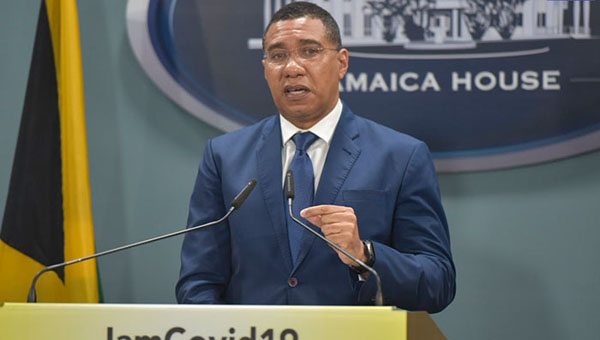KINGSTON, Jamaica, May 12, 2020 (CMC) – The Jamaica government is moving towards re-opening the country, announcing new curfew hours and warning also, it is prepared to “take tighter measures”, if the number of persons, testing positive for the coronavirus (COVID-19), shows an upward trend.
“As a result of the flattening of the curve, we believe we can give some space to our economy and to economic activities. If the numbers begin to trend upwards again, we will have to take tighter measures, “Prime Minister Andrew Holness, told a virtual news conference on Monday night.
Jamaica has, so far, recorded 505 cases of COVID-19, with 90 recoveries and nine deaths.
Holness said, effective Wednesday, business hours will now be open. “This means businesses can use their discretion, within the parameters of the curfew, to establish their work week, ensuring employees can get home before curfew hours”.
He said the new curfew hours would be between 8.00 pm to 5.00 am (local time) each day, until May 24.
The Prime Minister told reporters that that failure to kick-start the local economy, which is projected by the International Monetary Fund (IMF) to contract by 5.6 percent, could have a disastrous effect on the population, particularly the middle-class and the poor.
“If we don’t get our economy to full capacity, the little savings of the Jamaican middle-class will evaporate in a matter of weeks. For those people, who depend on the constant hustle – that can’t get out there and make a living – whatever daily savings they have, that will evaporate.
“So, let us not fool around with the understanding that we must return our economy to as close to capacity as possible,” Holness added.
He said plans were progressing for re-opening the vital tourism sector, and that the Cabinet had been presented with far-advanced protocols by Tourism Minister, Edmund Bartlett.
“With the closure of the global tourism industry, we had no choice here, but to close our hotels; but we must be prepared for the day, when we reopen. We will not allow the crisis to cripple us to the point, where we don’t take preparatory action.
“We have to be timing [it] very carefully, because other countries are going to reopen and people are going to travel, and Jamaica must be the number one destination for travel — that is how we recover stronger from (this) crisis,” Holness said, noting that other countries have already begun to prepare their own protocols.
“Jamaica must be the number one destination for travel when the tourism market reopens,” Holness said, while Bartlett told reporters that the protocols for the reopening of the tourism sector were far advanced, but not yet finalised.
He said an estimated 153,000 of the 170,000 tourism workers are now unemployed.
During the news conference, the government announced that it is ensuring that health protocols are strong enough to mitigate any risks, presented by reopening the country to visitors.
“We have not given a date yet… Whatever protocols are finally decided upon, as we have done with all the others, we will go into public discourse; then we will start with a trial phase, and then with a final reopening, once we have ironed out all the issues. So, yes, the government is contemplating the reopening of the tourism sector,” Holness said.
The government also announced that bars will be allowed to carry on their business, for a 14-day trial period, starting May 19.
“During that period, we will assess the operations of these bars,” said Local Government Minister, Desmond McKenzie
The authorities are also allowing churches to function, over the next two weeks, to have services under equally-tight restrictions.
“We will try the measures for two weeks. We will observe how faithfully they’re being implemented, and, if it works, then we will have them as a permanent feature in the Gazette,” Holness said.
“This will determine the number of persons that will be in the church space at any one time… that would ensure that if you were in a church hall of a thousand square feet, that you would have just over 20 persons, within the hall,” he added.
Churches will also be required to do temperature checks of worshippers on entry, and are asked to shorten the length of services, and, in instances, where more than one service is held, measures must be in place to ensure that they do not overlap.
Worshippers must also wear masks and a choir cannot be assembled during the period. Churches have been asked to put in place a sanitisation program.
“I know that the church is eager to get back to the normal way of worship, but we have to be cautious in how we do this,” Holness added.
 Pride News Canada's Leader In African Canadian & Caribbean News, Views & Lifestyle
Pride News Canada's Leader In African Canadian & Caribbean News, Views & Lifestyle





